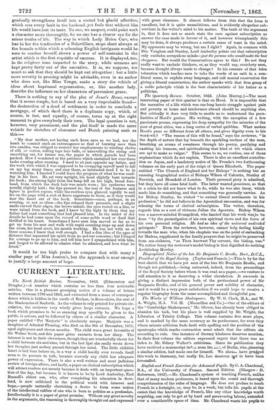CURRENT LITERATURE.
The North British Review. November, 1863. (Edmonston and Douglas.)—A number which contains no less than four noticeable articles. One is a pleasant gossiping notice of a volume of letters written between 1796 and 1843, and extracted from a mass of correspon- dence which is hidden in the castle of Brahan, in Ross-shire, the seat of the Mackenzies of Seaforth. As the volume is only printed for private cir- culation, the reviewer very wisely gives large extracts. We hope a book which promises to be so amusing may speedily be given to the public in extenso, and be followed by others of a similar character. A paper entitled "Pet Marjorie" is absolutely unique. Marjorie was a daughter of Admiral Fleming, who died on the 9th of December, 1811, aged eightyears and eleven months. The child was a great favourite of Sir Walter Scott, and this paper gives extracts from her diary. The interest is not in their cleverness, though they are wonderfully clever for a child between six and nine, but in the fact that she really wrote down her thoughts just as they passed through her mind. The little childish heart is laid bare before us, in a way a child hardly ever reveals itself even to its parents in talk, because scarcely any child has adequate power of expression. There is also a well written and most judicious review of foreign affairs, and lastly, a paper on clerical subscription which will attract readers not merely because it deals with an important ques- tion of the day, but because it is known to be by Lord Amberley, Earl Russell's eldest son, who, after completing his education in Scot- land, is now criticized in the political world with interest and hope,—people naturally cherishing a desire to form some notion of the intellectual calibre of one who is born to politics as a profession. Intellectually it is a paper of great promise. Without any great novelty in the arguments, the reasoning is thoroughly thought out and expressed
with great clearness. It almost follows from this that the form is excellent, but it is quite unambitious, and is evidently altogether sub- servient in the writer's mind to his matter. The fault of the argument is, that it does nob so much state the case against subscription as answer the case made in favour of it, and however triumphantly this
may be done, it always produces a certain sense of want in the mind.. My opponents may be wrong, but am I right? Again, in common with Drs. Vaughan and Stanley, Lord Amberley points out that subscription only excludes scrupulous minds—just the persons who would make the best clergymen. But would the Conservatives agree to this ? Do not they really want to exclude thinkers, or, as they would say, crotchety men, because thought always tends to change ? In his censure of that false toleration which teaches men to take the words of an oath in a non- literal sense, to explain away language, and call mental reservation the giving a liberal construction, the author speaks with that firm grasp of a noble principle which is the beat characteristic of his father as a politician.






























 Previous page
Previous page